Who bought Hitler’s top hat?
The large market in Nazi memorabilia is legal. OK, but the names of buyers should be made public.

A collapsible top hat that supposedly belonged to Adolf Hitler sold for 50,000 euros ($55,300) at a Munich-based online auction on Wednesday. Along with a number of other Nazi items, it was purchased by Swiss-Lebanese investor Abdallah Chatila who donated it to Keren Hayesod, the Israeli fundraising organization. But he couldn't get all the Nazi memorabilia that were on offer. It's time the other buyers got more attention.
The market for Nazi memorabilia is large and apparently growing, boosted by several auction houses that include Alexander Historical Auction in Maryland and Hermann Historica in Grasbrunn near Munich, which have picked up the trade rejected by top auctioneers such as Sotheby's and Christie's, and even by eBay. The authenticity of many of the objects on this market is highly questionable: Last month, a large trove of Nazi artifacts discovered in Argentina — and almost accepted for display by the Holocaust Museum in Buenos Aires — was found to be fake, especially made for sale to people who collect this kind of thing.
Bart F.M. Droog, a Dutch investigative journalist who follows the trade, doubts that the top hat sold on Wednesday really belonged to Hitler. But the large number of Nazi artifacts — from Hitler watercolors to his companion Eva Braun's clothes — available today, and the prices they fetch, speak to a lively demand. A counterfeiting industry wouldn't have sprung up if that demand weren't there.

The auction house owners insist that their buyers aren't Nazi sympathizers. "By far the biggest share of buyers who acquire from us are museums, state collections and private collectors who study the subject matter painstakingly," Bernhard Pacher, the owner of Hermann Historica, told the German TV station NTV. "It's up to us to stop the wrong people from getting their hands on" the Third Reich items.
Apart from the auctioneers, though, few people have any idea who the buyers really are. It's hard to imagine any government-owned museum bidding for a Hitler top hat; there's no shortage of Nazi memorabilia for them to display. But some top private collectors are known.
One is U.K. real estate multimillionaire Kevin Wheatcroft, who owns 88 tanks, sleeps in Hitler's bed and admires the fuehrer's "eye for quality." Another was Henry Frederick Thynne, the Marquess of Bath, who died in 1992, leaving behind a huge collection of Nazi artifacts that has caused no end of worry to his heirs; the late aristocrat was a decorated World War II veteran, but he also has been described as a Hitler admirer. Apparently, the Holocaust denier David Irving, too, had something of a Hitler-related collection. After he was declared bankrupt in 2002, he tried to sell some items online, including Hitler's walking stick.
Droog has told me some of the interest in the memorabilia comes from China and other Asian countries, where the Nazi atrocities are a more distant, more abstract story than in Europe and the US

But all in all, information about the buyers in this market, where thousands of items change hands every year through the auctions and outside them, is scarce. For all his stated desire to prevent the artifacts from falling into the wrong hands, Pacher says it's "practically impossible to prevent one or two people with the wrong ideology" from cropping up among buyers.
The standard argument against the trade in Nazi items is that even if they must be preserved, it's immoral to trade in them and to derive a profit. Rabbi Menachem Margolin, chairman of the European Jewish Association, wrote a letter to Hermann Historica earlier this month, asking the firm to cancel the sale of Nazi objects because "some things, particularly when so metaphorically blood-soaked, should not and must not be traded."
Hermann Historica was within its rights when it ignored Margolin's call, though. In Germany, it's legal to sell Nazi objects — it's only Nazi symbols like the swastika that are banned. It would probably be wrong to ban such sales, too. Some items, especially documents, must be preserved for historical study; Hitler's thoroughly banal watercolors can explain a lot about the determinants of his political career. And if such objects have a material value, it can't be legislated away.
Chatila, who bought the top hat and paid 130,000 euros for Hermann Goering's richly decorated copy of "Mein Kampf", did his bit as a private individual to make sure the items didn't go to Nazi worshippers. "It is extremely important to me that items from this painful historical era do not land in the wrong hands," he said in a press release. "I would have liked to purchase more items, but unfortunately I did not get all the bids."
Governments can do more. If Germany is serious about atoning for the country's Nazi past, it should force the auction houses to disclose the names of those who buy Nazi items. If these are museums or students of Third Reich history, it should be no problem for them to be publicly named. Wheatcroft, who is no historian, makes no secret of his passion for Nazi objects — nor should others who share it. If they seek anonymity, surely there's something unhealthy about their interest?
It would be fair if the buyers of the artifacts Chatila failed to acquire on Wednesday would answer any questions the German authorities or the media might have about their hobby.
Such a requirement, of course, might turn the Nazi memorabilia trade into a black market. But then, direct sales to museums and established collections wouldn't be hindered. As for the rest of the market, perhaps it doesn't deserve the legitimacy that auctions lend to it.
Disclaimer: This article first appeared on Bloomberg.com, and is published by special syndication arrangement."



 Keep updated, follow The Business Standard's Google news channel
Keep updated, follow The Business Standard's Google news channel
















